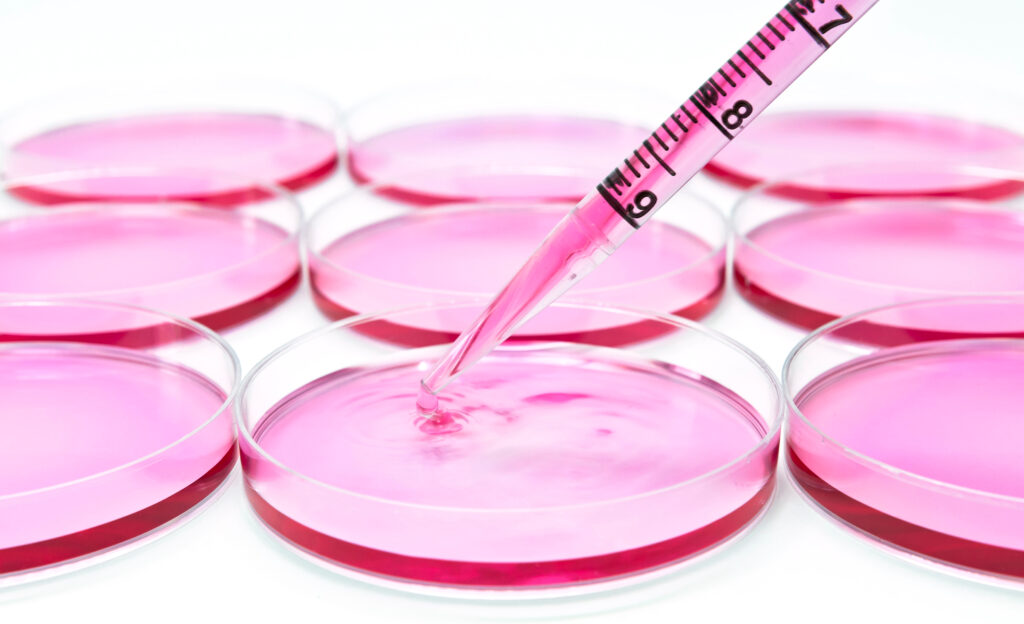A vaccine is a treatment that helps the body to develop immunity to a specific disease without causing the illness itself. Whilst vaccines traditionally target infectious disease, like chicken pox, a potential breast cancer vaccine has completed Phase 1 clinical trials, or the very first stage of testing in humans. This marks a significant development in cancer prevention research. This investigational vaccine is designed to train the body’s immune system to recognise and attack breast cancer cells before tumours can form – offering hope particularly for those at high risk of developing triple-negative breast cancer (TNBC), one of the most aggressive and difficult-to-treat subtypes.
The initial trial included women previously diagnosed with early-stage TNBC or with a strong family history of the disease. Early results suggest that the vaccine is safe and able to stimulate a strong response by the immune system. It is now progressing into Phase 2, or the next stage of research in humans, which will involve a larger and more diverse group of participants to further evaluate its efficacy in reducing breast cancer incidence.
Breast Cancer Trials’ View on the Research
Breast Cancer Trials, the largest independent clinical trials research group in Australia and New Zealand, is closely monitoring this emerging area of cancer vaccine news with keen interest.
While this vaccine appears promising in pre-clinical and very early trials in humans, previous anti-cancer vaccines in breast cancer have been ineffective. To date, the most successful vaccine to reduce cancer occurrence is the HPV, or human papillomavirus vaccine, which has dramatically reduced the number of cases of cervical as well as head and neck cancers. We look forward to the findings of further quality research into a breast cancer vaccine, which is peer reviewed and independently analysed.
Other Vaccine Research for Breast Cancer
Beyond triple-negative breast cancer, researchers are exploring vaccines for other breast cancer subtypes. For instance, the Moffitt Cancer Center has developed a dendritic cell vaccine targeting HER2-positive, oestrogen receptor-negative breast cancer. In a pilot study, this vaccine, combined with standard chemotherapy, demonstrated both safety and positive response rates, with complete tumour disappearance observed in a notable percentage of .
Additionally, mRNA vaccine platforms, accelerated by COVID-19 vaccine development, are being investigated for their potential in breast cancer treatment, offering a novel approach to stimulate the immune system against cancer cells.
While these developments are promising, it’s important to note that breast cancer vaccines are still in the early stages of clinical trials. Further research is needed to confirm their efficacy and safety across larger, more diverse groups of patients. If subsequent trials are successful, these vaccines could become a pivotal component in breast cancer prevention and treatment strategies, with the hope of transforming the landscape of cancer care in the coming years.
Research into Cancer Vaccines
The development of the human papillomavirus (HPV) vaccine was a landmark achievement in cancer prevention, with Australian researchers playing a pivotal role. Professor Ian Frazer and the late Dr Jian Zhou at the University of Queensland led the groundbreaking research in the 1990s that underpinned the creation of the first HPV vaccine. They developed a method to produce virus-like particles that mimic the HPV virus, triggering a strong immune response without using actual viral DNA. This work formed the basis for the Gardasil and Cervarix vaccines, which protect against the high-risk HPV strains responsible for the majority of cervical cancer cases, as well as several other cancers including throat, anal, and penile cancers.
Australia was also among the first countries to roll out a national HPV vaccination program in 2007, offering the vaccine free to school-aged girls and later extending it to boys. The impact has been profound: rates of HPV infection, cervical abnormalities, and genital warts have dropped significantly, and estimates predict that Australia could become the first country to effectively eliminate cervical cancer by as early as 2035. Australian researchers continue to lead in monitoring vaccine effectiveness, refining public health strategies, and expanding global access to HPV vaccination, particularly in low- and middle-income countries.
The hepatitis B vaccine is another cancer preventing vaccine. It plays a key role in preventing liver cancer caused by chronic hepatitis B infection, which is especially important in communities where the virus is more common. In Australia, the vaccine became part of the National Immunisation Program in 2000, with earlier targeted efforts for high-risk groups such as healthcare workers, Aboriginal and Torres Strait Islander communities, and migrants from countries with high hepatitis B rates. While the vaccine itself was developed internationally in the 1980s, Australian researchers and public health experts have played a significant role in improving vaccine delivery, surveillance, and community engagement.
These examples show how cancer vaccines can become a powerful tool in cancer prevention – adding to the importance of continued research into a vaccine for breast cancer.
Frequently Asked Questions
Is there a vaccine for breast cancer?
No. A breast cancer vaccine has shown encouraging results in early-stage clinical testing, particularly for triple-negative breast cancer. However, further trials are underway.
When will a breast cancer vaccine be available?
There is a breast cancer vaccine currently in early-stage clinical trials. If ongoing research confirms its safety and effectiveness, it could become available in future years. However, widespread availability will depend on further testing and regulatory approvals.
What is a cancer vaccine?
A cancer vaccine helps the immune system recognise and destroy cancer cells, either to prevent cancer from forming or to help treat it in its early stages.
Sources:
SITC 2024 Poster No 7999: Phase 1 Trial of alpha-lactalbumin vaccine in high risk operable triple negative breast cancer (TNBC) and patients at high genetic risk for TNBC.
About Breast Cancer Trials
Breast Cancer Trials is a world-leading research organisation dedicated to advancing breast cancer treatments through groundbreaking clinical trials, ensuring the most accurate and up-to-date information on skin changes and other breast cancer symptoms.
Sign up to our newsletter to stay up to date with the latest breakthroughs



